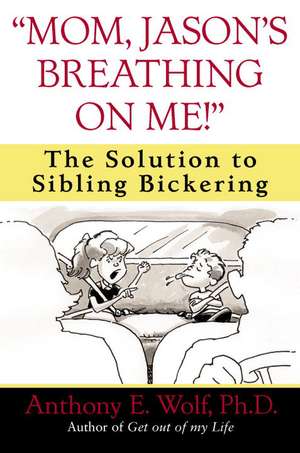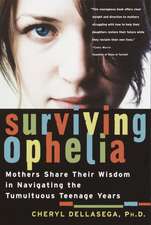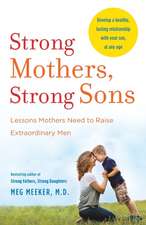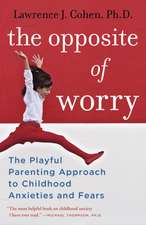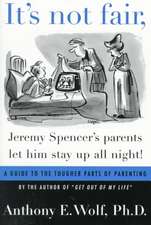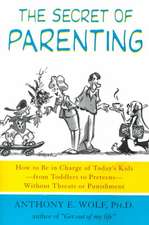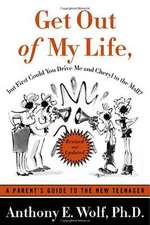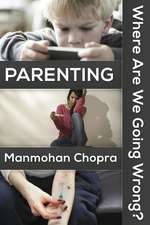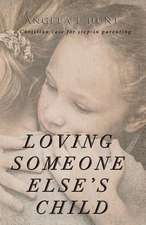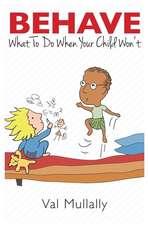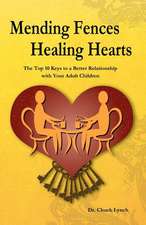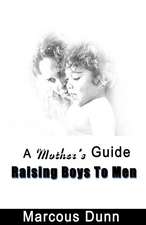"Mom, Jason's Breathing on Me!": The Solution to Sibling Bickering
Autor Anthony E. Wolfen Limba Engleză Paperback – 31 iul 2003
AT LAST—SOUND, PRACTICAL RELIEF
FOR PARENTS WITH BATTLING KIDS!
Imagine. You might never again have to hear the words: “Mommy, Ann drooled on me on purpose.” You could have the answer for every “It’s not fair!” your kids have ever whined at you. Constant sibling squabbling—and the ensuing demand that you pick a side, quick—can wear parents down and totally drain the fun right out of family life. Now in this groundbreaking book, Dr. Anthony Wolf offers a whole new strategy for coping. In a fresh, funny, and straightforward way, Dr. Wolf presents three essential rules for dealing with sibling arguments—rules that, if followed, completely remove the root causes of bickering. From teasing and hitting to rivalries and boundaries, Dr. Wolf addresses a wide range of issues, and he does it with humor and a pitch-perfect ear for actual kid/parent dialogue. This is a book about real children—who they are, what they want, why they act as they do, and what you can do to alleviate the strife between siblings.
Preț: 100.28 lei
Nou
Puncte Express: 150
Preț estimativ în valută:
19.19€ • 20.00$ • 15.98£
19.19€ • 20.00$ • 15.98£
Carte disponibilă
Livrare economică 14-28 decembrie
Preluare comenzi: 021 569.72.76
Specificații
ISBN-13: 9780345460929
ISBN-10: 0345460928
Pagini: 224
Dimensiuni: 139 x 210 x 13 mm
Greutate: 0.27 kg
Editura: BALLANTINE BOOKS
ISBN-10: 0345460928
Pagini: 224
Dimensiuni: 139 x 210 x 13 mm
Greutate: 0.27 kg
Editura: BALLANTINE BOOKS
Notă biografică
Anthony E. Wolf, Ph.D., is a practicing clinical psychologist and the author of many bestselling books. He has worked with children and adolescents for more than thirty years and lectures widely on parenting topics. He lives in Suffield, Connecticut.
Extras
1.
The Solution to Sibling Bickering
Mary Alice and I—What We Did
We had a three-part plan.
1. If we intervened in squabbling between Nick and Margaret, it would never be on one side or the other. “The two of you stop it.” The one and only exception was if there was potential harm to one or the other (and harm does not mean only pain).
2. The point in the squabbling at which we would intervene was as soon as we started to get irritated.
3. We would never listen to what went on. And I mean never. Again, the only exception was if there was potential harm to one or the other child.
That was it. Those were the rules. And they worked. And because they worked, we kept using them. The results were spectacular. Nick and Margaret bickered, but what made all the difference for Mary Alice and me was that we did not get the constant, “Nicky kicked my sticker album.” “I did not, she put it down right where I was sitting.” “I did not. Besides he’s not the boss of the TV room.” “Mom, she’s lying.” “Nicky, you’re a liar.” “Dad, he’s going to hit me.”
We didn’t get any of that because from early on both Nick and Margaret learned that if they came to us with their bickering, what they would get—always—was nothing. So they did not include us, because there was no reason to.
One gigantic benefit of our procedure was that it eliminated, absolutely and wholly removed, the number one cause of sibling rivalry: trying to get a parent on your side. We wouldn’t do it. We refused to enter that arena. The great parental courtroom to which grievances are taken and final judgment made of who was right and who was wrong, the court that is such a huge part of virtually all childhoods, certainly mine, that court, the judgment from which engenders such sibling passion, for Nick and Margaret was empty. The judge wasn’t there. There was no judge.
Nick and Margaret had many disagreements, the same disagreements all siblings have. But the disagreements were about whatever they were disagreeing about: who is hogging too much of the seat, who gets the slightly broken cookie, who gets to use the red Magic Marker, intrusion on each other’s space. What the disagreements were never about was on whose side Mary Alice or I would be. That element, parent favor or not, never came into the disagreements, was not a part of them. In their disagreements, a parent was not even part of the equation.
And since it was impossible to get a parent on your side—nor could your sibling get your parent on his or her side—grievances between the two were limited to the specifics of day to day. The heart of true enmity between siblings was absent. Parent favor was never on the table.
The constant sibling squabbling that can wear you down and so totally drain the fun and any pleasure out of time spent with your children didn’t exist. We were out of the loop. The squabbling that did occur was not the stomach-tightening Oh, no, here they go again, with whatever peace you had at any given moment instantly replaced by that familiar tension. This was not part of our raising of Nick and Margaret.
One thing that I can say as an absolute fact is that when they were growing up, being with Nick and Margaret was fun. I know. I was there. I do remember. Maybe not always, maybe not all the time, but overwhelmingly being with them was fun. Maybe this is a tribute to them, their personalities when growing up. Maybe it was because of what else Mary Alice and I did or did not do as parents. But I also have no doubt that a major part of the enjoyableness of Nick and Margaret, how we could go places, be places with them, so differ- ent from when I was growing up, was the direct benefit of our system of dealing with sibling squabbling. Not only were we wholly out of the loop, but they—because they had no choice, no alternative—were forced to get a lot of practice at working things out on their own.
When Nick and Margaret were little, there was a television set in a small sitting area that was an extension of our kitchen. On Saturdays they were allowed to watch kid TV programs from whenever they woke up until noon. One TV, two kids. My memory is that only once in the history of their Saturday-morning TV watching was there squabbling that resulted in our having to intervene, at which point the TV watching ended for that morning. My memory may not be totally accurate, but I will vouch that interventions were exceedingly rare. Somehow, for four hours every Saturday morning, Nick and Margaret worked out on their own, without major squabbling, which programs they would watch. What was their system? I have no idea.
Try this one. One summer when Margaret was five and Nick was seven, I was between jobs and Mary Alice was a high school teacher. We decided to take a seven-week family vacation driving in a station wagon (it was before the era of vans) around the West, mainly Colorado and California. In three days I drove by myself from Springfield, Massachusetts, to Denver, where I met Mary Alice, Nick, and Margaret, who had flown there. Then we headed out. Seven weeks driving through the West, camping or periodically staying in motels (one room).
Seven weeks in a station wagon—did I mention that it had no air-conditioning? At one point driving through Arizona, seeing Nick lying asleep in the back of the station wagon, sweat in little beads over his pink face, I thought that we had accidentally roasted him. Seven weeks in a station wagon with the Wolf kids.
We had a good time. Nick and Margaret were easy. Even very easy. There was arguing, but by far the most serious and most frequent offenders were not the children.
Rule 1: Don’t Take Sides
Let me describe the rules in more detail.
Rule 1: Never intervene on one side or the other unless there is possible harm.
Maurice was putting away dishes while watching TV when high-pitched screaming erupted. Going into the next room, he beheld his seven-year-old son Louis sitting on five-year-old Lainie, hitting her on the back. The screaming was coming from Lainie because she was being sat upon and hit on the back by her brother.
Rule 1 says never intervene on one side or the other unless there is possible harm. By harm I mean the possibility of causing injury, not minor pain. Maurice has to make a swift decision. Does he feel that what Louis is doing to his sis- ter could result in possible harm? Let’s say he decides that his seven-year-old son beating on the back of his five-year-old daughter does not represent a serious threat of injury. Then his intervention must be, “The two of you, stop it, now.”
If Louis does not immediately stop and get off Lainie, Maurice must remove Louis from atop his sister. If Maurice decides that there is no potential harm, Rule 1 says he should not intervene on one side or the other. He does not say, “Louis, stop hitting your sister.”
By saying, “The two of you stop it,” and pulling Louis off his sister if he does not immediately stop hitting, Maurice has accomplished what is necessary. The hitting has now stopped and no side has been taken.
On the other hand, should he say, “Louis, stop hitting your sister,” he is taking a side.
What he will get is, “But Lainie messed up my cars and she was pinching me.”
“I did not. Louis never lets me play with anything.”
“I do too, but you mess everything up.”
Saying, “Louis stop hitting your sister,” adds nothing. Louis knows perfectly well that he is not supposed to hit his sister. Regardless, his father’s intervention has stopped the hitting. If the squabbling then ends, Maurice needs to do no more. He can return to what he was doing. All “Louis, stop hitting your sister” adds is an argument.
Better, if there is no threat of harm: “The two of you, stop it, now.”
The squabbling may continue—often it will. Maybe Louis and Lainie keep yelling at each other, or one or the other wants to keep the physical fight going.
Hands clawed, Lainie rushes at her brother, shouting, “Make him stop hitting me,” even though the hitting has stopped. (Six months previously she had perfected the Pinch of Death.)
The Solution to Sibling Bickering
Mary Alice and I—What We Did
We had a three-part plan.
1. If we intervened in squabbling between Nick and Margaret, it would never be on one side or the other. “The two of you stop it.” The one and only exception was if there was potential harm to one or the other (and harm does not mean only pain).
2. The point in the squabbling at which we would intervene was as soon as we started to get irritated.
3. We would never listen to what went on. And I mean never. Again, the only exception was if there was potential harm to one or the other child.
That was it. Those were the rules. And they worked. And because they worked, we kept using them. The results were spectacular. Nick and Margaret bickered, but what made all the difference for Mary Alice and me was that we did not get the constant, “Nicky kicked my sticker album.” “I did not, she put it down right where I was sitting.” “I did not. Besides he’s not the boss of the TV room.” “Mom, she’s lying.” “Nicky, you’re a liar.” “Dad, he’s going to hit me.”
We didn’t get any of that because from early on both Nick and Margaret learned that if they came to us with their bickering, what they would get—always—was nothing. So they did not include us, because there was no reason to.
One gigantic benefit of our procedure was that it eliminated, absolutely and wholly removed, the number one cause of sibling rivalry: trying to get a parent on your side. We wouldn’t do it. We refused to enter that arena. The great parental courtroom to which grievances are taken and final judgment made of who was right and who was wrong, the court that is such a huge part of virtually all childhoods, certainly mine, that court, the judgment from which engenders such sibling passion, for Nick and Margaret was empty. The judge wasn’t there. There was no judge.
Nick and Margaret had many disagreements, the same disagreements all siblings have. But the disagreements were about whatever they were disagreeing about: who is hogging too much of the seat, who gets the slightly broken cookie, who gets to use the red Magic Marker, intrusion on each other’s space. What the disagreements were never about was on whose side Mary Alice or I would be. That element, parent favor or not, never came into the disagreements, was not a part of them. In their disagreements, a parent was not even part of the equation.
And since it was impossible to get a parent on your side—nor could your sibling get your parent on his or her side—grievances between the two were limited to the specifics of day to day. The heart of true enmity between siblings was absent. Parent favor was never on the table.
The constant sibling squabbling that can wear you down and so totally drain the fun and any pleasure out of time spent with your children didn’t exist. We were out of the loop. The squabbling that did occur was not the stomach-tightening Oh, no, here they go again, with whatever peace you had at any given moment instantly replaced by that familiar tension. This was not part of our raising of Nick and Margaret.
One thing that I can say as an absolute fact is that when they were growing up, being with Nick and Margaret was fun. I know. I was there. I do remember. Maybe not always, maybe not all the time, but overwhelmingly being with them was fun. Maybe this is a tribute to them, their personalities when growing up. Maybe it was because of what else Mary Alice and I did or did not do as parents. But I also have no doubt that a major part of the enjoyableness of Nick and Margaret, how we could go places, be places with them, so differ- ent from when I was growing up, was the direct benefit of our system of dealing with sibling squabbling. Not only were we wholly out of the loop, but they—because they had no choice, no alternative—were forced to get a lot of practice at working things out on their own.
When Nick and Margaret were little, there was a television set in a small sitting area that was an extension of our kitchen. On Saturdays they were allowed to watch kid TV programs from whenever they woke up until noon. One TV, two kids. My memory is that only once in the history of their Saturday-morning TV watching was there squabbling that resulted in our having to intervene, at which point the TV watching ended for that morning. My memory may not be totally accurate, but I will vouch that interventions were exceedingly rare. Somehow, for four hours every Saturday morning, Nick and Margaret worked out on their own, without major squabbling, which programs they would watch. What was their system? I have no idea.
Try this one. One summer when Margaret was five and Nick was seven, I was between jobs and Mary Alice was a high school teacher. We decided to take a seven-week family vacation driving in a station wagon (it was before the era of vans) around the West, mainly Colorado and California. In three days I drove by myself from Springfield, Massachusetts, to Denver, where I met Mary Alice, Nick, and Margaret, who had flown there. Then we headed out. Seven weeks driving through the West, camping or periodically staying in motels (one room).
Seven weeks in a station wagon—did I mention that it had no air-conditioning? At one point driving through Arizona, seeing Nick lying asleep in the back of the station wagon, sweat in little beads over his pink face, I thought that we had accidentally roasted him. Seven weeks in a station wagon with the Wolf kids.
We had a good time. Nick and Margaret were easy. Even very easy. There was arguing, but by far the most serious and most frequent offenders were not the children.
Rule 1: Don’t Take Sides
Let me describe the rules in more detail.
Rule 1: Never intervene on one side or the other unless there is possible harm.
Maurice was putting away dishes while watching TV when high-pitched screaming erupted. Going into the next room, he beheld his seven-year-old son Louis sitting on five-year-old Lainie, hitting her on the back. The screaming was coming from Lainie because she was being sat upon and hit on the back by her brother.
Rule 1 says never intervene on one side or the other unless there is possible harm. By harm I mean the possibility of causing injury, not minor pain. Maurice has to make a swift decision. Does he feel that what Louis is doing to his sis- ter could result in possible harm? Let’s say he decides that his seven-year-old son beating on the back of his five-year-old daughter does not represent a serious threat of injury. Then his intervention must be, “The two of you, stop it, now.”
If Louis does not immediately stop and get off Lainie, Maurice must remove Louis from atop his sister. If Maurice decides that there is no potential harm, Rule 1 says he should not intervene on one side or the other. He does not say, “Louis, stop hitting your sister.”
By saying, “The two of you stop it,” and pulling Louis off his sister if he does not immediately stop hitting, Maurice has accomplished what is necessary. The hitting has now stopped and no side has been taken.
On the other hand, should he say, “Louis, stop hitting your sister,” he is taking a side.
What he will get is, “But Lainie messed up my cars and she was pinching me.”
“I did not. Louis never lets me play with anything.”
“I do too, but you mess everything up.”
Saying, “Louis stop hitting your sister,” adds nothing. Louis knows perfectly well that he is not supposed to hit his sister. Regardless, his father’s intervention has stopped the hitting. If the squabbling then ends, Maurice needs to do no more. He can return to what he was doing. All “Louis, stop hitting your sister” adds is an argument.
Better, if there is no threat of harm: “The two of you, stop it, now.”
The squabbling may continue—often it will. Maybe Louis and Lainie keep yelling at each other, or one or the other wants to keep the physical fight going.
Hands clawed, Lainie rushes at her brother, shouting, “Make him stop hitting me,” even though the hitting has stopped. (Six months previously she had perfected the Pinch of Death.)
Recenzii
Praise for Get Out of My Life, but First Could You Drive Me and Cheryl to the Mall?
“Funny, sound, and compassionate, [this book] will truly help you talk to your kids and not get mad all the time.”
—BETH WINSHIP
The Boston Globe
Praise for It’s Not Fair, Jeremy Spencer’s Parents Let Him Stay Up All Night!
“Dr. Wolf’s anecdotes ring so true that you are sure to hear your own voice—not to mention the voices of your children—in these pages.”
—PAMELA ABRAMS
Editor-in-Chief, Child
Praise for Dr. Anthony Wolf’s Get Out of My Life,
but First Could You Drive Me and Cheryl to the Mall?
“The title of this wonderful book reveals at once that Dr. Wolf does more than listen to young people. He hears them and then goes beyond their protestations and pleading to provide us with an understanding of their lives. Without piety, self-righteousness, or arrogance, he offers assistance and advice for living with, dare I even say raising, our teens in a loving and compassionate manner.”
—THOMAS J. COTTLE, Ph. D.
Massachusetts School of Professional Psychology
“Dr. Wolf empathizes with parents, does not belittle teens, and makes both wonderfully human. Get Out of My Life has Spock’s common sense, the insight of Freud, and the wit of Bombeck. I welcome this book.”
—DOROTHY M. ZEISER, Ph. D.
Chairman, Department of Child Study
Education and Special Education,
Saint Joseph College
“I love this book! It is easy to read, practical, and while putting the needs of the children first understands the instincts of parents.”
—KATHY LYNN
Parenting Today
“Funny, sound, and compassionate, [this book] will truly help you talk to your kids and not get mad all the time.”
—BETH WINSHIP
The Boston Globe
Praise for It’s Not Fair, Jeremy Spencer’s Parents Let Him Stay Up All Night!
“Dr. Wolf’s anecdotes ring so true that you are sure to hear your own voice—not to mention the voices of your children—in these pages.”
—PAMELA ABRAMS
Editor-in-Chief, Child
Praise for Dr. Anthony Wolf’s Get Out of My Life,
but First Could You Drive Me and Cheryl to the Mall?
“The title of this wonderful book reveals at once that Dr. Wolf does more than listen to young people. He hears them and then goes beyond their protestations and pleading to provide us with an understanding of their lives. Without piety, self-righteousness, or arrogance, he offers assistance and advice for living with, dare I even say raising, our teens in a loving and compassionate manner.”
—THOMAS J. COTTLE, Ph. D.
Massachusetts School of Professional Psychology
“Dr. Wolf empathizes with parents, does not belittle teens, and makes both wonderfully human. Get Out of My Life has Spock’s common sense, the insight of Freud, and the wit of Bombeck. I welcome this book.”
—DOROTHY M. ZEISER, Ph. D.
Chairman, Department of Child Study
Education and Special Education,
Saint Joseph College
“I love this book! It is easy to read, practical, and while putting the needs of the children first understands the instincts of parents.”
—KATHY LYNN
Parenting Today
Descriere
Offering a solution for sibling bickering, bestselling parenting author Dr. Anthony Wolf presents fresh, funny, and very helpful strategies.
